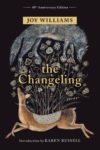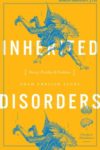
[Unnamed Press; 2021]
In her 2018 book, The Recovering, Leslie Jamison writes about the power of showing up, paying attention, and listening as an antidote for addiction. During her recovery from alcoholism, Jamison attended AA meetings and began writing journalistically, which involves listening to the stories of others. “I’d never done anything like this, conducting interviews and gleaning observations to write about the lives of strangers, and the sheer plentitude thrilled me — how much was all around me, just waiting to be gathered,” Jamison writes. “The voices of others made me want to drop down on my knees in front of them — to thank them for letting me lose myself for a moment by listening to them.”
This idea, that we can heal ourselves by observing and listening to others is paradoxical: we can find ourselves, find the soothing salve for our traumas, not by probing our own experiences, but instead by losing ourselves in the stories of others, which brings to mind the famous quote from Henry David Thoreau: “Not until we are lost, do we begin to find ourselves.” Iterations of this idea seem commonplace within various cultures — just the other day, the little white slip inside of my fortune cookie read, “To truly find yourself, you should play hide and seek alone.” The idea that one must lose themselves in order to find themselves is nothing new or groundbreaking — it has essentially become part of collective conscience. Yet, as Joy Williams once said in an interview, the work of the fiction writer is to “unexpress the expressible,” by which I believe she means to complexify a seemingly ordinary idea through the idiosyncratic intricacies of one specific character’s story.
There is the belief that a person needs to have hit rock bottom in order to recover, but only a talented author, like Rebecca Handler, can show us what that looks like in gritty, realistic and darkly hilarious detail. Edie Richter is Not Alone is about a woman struggling to admit a horrible act that she has committed, and like Leslie Jamison’s recovery from alcoholism, Edie only moves towards a place of recovery by forgetting herself and engaging with strangers — observing them, chit-chatting with them and absorbing the plentitude of her surroundings, which often results in some interesting, comical and chaotic predicaments. In Handler’s own words, Edie Richter is Not Alone is a novel about a woman making “a mess of things before straightening them out.”
Edie Richter is in her late thirties, living in Boston with her husband of ten years, when her father is diagnosed with Alzheimer’s. She quits her job at an anti-hunger organization and the couple moves to San Francisco to be closer to her father. After her father’s death, Edie’s husband, Oren, is offered a job in one of the most isolated cities in the world: Perth, Western Australia. They move across the globe, all the while Edie holds onto a secret that is isolating her from her husband just like the great outback separates Perth from the rest of the country. The secret is “an unthinkable act that she can barely admit to herself” — as reads the blurb on the outside of the book.
The blurb made me think that this deep, dark secret would be withheld from the reader until the very end of the book, but in fact, Handler reveals what happens quite early, at the end of chapter three. This book is not meant to be a mystery, nor a detective novel that keeps the reader guessing. The point of this novel is transparency, allowing the reader to understand and track how Edie’s secret manifests, grows, morphs and ultimately affects her identity and her marriage. For this reason, I feel comfortable spoiling the secret in this review. For, without divulging the secret, it would be impossible to understand the nature of Edie’s guilt and why she had to leave her family to find comfort among strangers. If you haven’t read the book yet and don’t want to know what Edie did, stop reading now.
The secret: in order to end her father’s misery, Edie holds one of his old t-shirts up to his mouth, pinches his nostrils and suffocates him to death. “If you were to ask me all about it, I guess I’d say it ended up as something really big but started out as something really small, if I were to say anything at all about it,” narrates Edie. “I didn’t plan on killing my father. In fact, I don’t even like to put it that way. I didn’t plan on ending my father’s life, if you can call it a life when a person has essentially become a thing. But an idea can appear like a new freckle and become a cancer.”
Handler depicts Alzheimer’s as a disease that changes a person into “a thing” and leads loved ones to sacrifice everything to be caretakers. Television makes Edie’s father anxious because he can’t follow the storyline, so he spends most of his time staring out the window. He tries to flirt with his daughter, not understanding who she is, saying, “Pretty lady show me your smile.” And eventually he stops speaking, “except for the occasional stutter that was usually accompanied by pointing at something. Ma, ma, ta, ta.” In one of his last moments, he can’t figure out how to use a spoon, so Edie feeds him his orange juice drop by drop from the tip of her finger. These exceedingly poignant moments showcase Handler’s skill because they manage to be heartbreaking without being sentimental: “Mrs. Whitaker gave us a pillow with a Jane Austen quote. There is nothing like staying at home for real comfort. This one we kept between his thighs to help with chafing,” she writes.
This realistic portrayal speaks to the impossibility of the situation — when a loved one is slowly dying from Alzheimer’s, the family does everything they can to cling on, even if they’re clinging onto a person that is completely different from the person they knew before the diagnosis. “I knew Dad would stop recognizing me,” Edie narrates. “I didn’t know I would stop recognizing him.” The novel begs the questions, when a life has declined so dramatically that it is unrecognizable, is it still worth living? When can a life be deemed not worth living? And who has the right to deem it so?
The novel doesn’t exactly answer these thorny, philosophical questions, because there are no right or wrong answers. Instead, Handler focuses on how, when faced with such immense suffering and moral ambiguity, humans are often pushed to take impulsive and desperate actions to end the pain, at whatever cost. While she is suffocating her father, Edie thinks about all the suffering and all the sacrifices that the Alzheimer’s has caused: “I thought of Mom and the book on the afterlife that she had just purchased online. I thought of Igor and how he missed his sister’s wedding in Croatia last year to stay with Dad. I thought of all the pills, the appointments, and the mountain of paperwork.” Edie was simply trying to make things better for her father and everyone around her, but by doing so she permanently changed her own life.
Edie keeps the secret bottled up inside of her for six months, which as the title suggests, makes her feel extremely alone, especially when it comes to her marriage. She becomes emotionally distant from her husband, as if her secret has taken the place in her heart that he used to occupy. Instead of confronting what has happened, she focuses most of her time on observing and collecting the most minute, and often mundane, details of her new life in Perth — which seems to be her own form of therapy. By losing herself in the idiosyncrasies of others — like the driving instructor, Jamie, who says, “Good on ya” and insists on going to Bunnings to pick up supplies to fix their broken screen door; Edie’s neighbor Fiona, a mother of two, who “looked like an antidepressant commercial” and “walked like someone who was popular in high school”; and the “half-man, half-chess piece” realtor depicted on six billboards around the city, advertising “TopRate Realty” — Edie slowly works towards recovery.
“People and their habits feel useful to me in a way I can’t explain,” Edie narrates. “Telling someone else’s story is easy. You focus on one detail and it sticks with people, makes the subject more memorable, more appealing. It is different when it comes to your own story. You can’t see the thing that stands out, the quality that makes you different from every other person. You certainly feel different, but your perception of yourself is too skewed to count for anything. You can never know what it’s like to talk to you, what it’s like to walk next to you, or what it feels like to touch you. You never really see yourself. You project your bits out into the world for everyone to collect like shells. You belong to everyone.”
Edie’s observations are precise, poetic and contribute greatly to the novel’s verisimilitude, which is not surprising considering that Handler’s material comes from the seeds of her own observations of daily life in Perth. In an interview with her brother on the City Arts & Lectures podcast, Handler said that she lived in Perth for three years and kept a blog, along with meticulous notes on all that was around her. Once, she accidentally sent a haiku of three things that she noticed to her brother in an email and he responded: “Aha. I knew it. She starts with observation.”
Well, the observations certainly paid off. Having also lived in Perth for two years myself, I found Handler’s descriptions to ring true and make me nostalgic for those hot golden days of my childhood. “If it weren’t for all the billboards, I could have seen for miles,” Edie observes when they first arrive. “The air smelled like fire, eucalyptus and car exhaust.” And Handler is careful to include the jargon as well, using words like “reckon” and “esky,” all of which make this novel almost ethnographic in its extraordinary attention to detail.
And not only are the observations acutely realistic, but the writing style packs a punch as well. Each paragraph is sparse, compact and seemingly simple, reading like a prose poem: “In second grade, the teacher instructed us to draw a rainbow and then cover it with black crayon. We unfolded paper clips and scraped over the black, revealing slivers of color. I took my drawing home and stuffed it behind the bookshelf. It wasn’t a rainbow at all anymore.” Like the characters in this novel, the sentences appear simple on the surface; but, if a reader chooses to go deeper, they will see that they’re actually brimming with meaning.
Edie’s experiences in Perth also trigger many flashbacks, both with her father and without, which help to construct the complexity of Edie’s character. She is emotionally distant, peculiar and, boy, did she make me laugh, really laugh out loud, which is a rare thing for a character in a book to do. During her childhood, her father called her an enigma: “Dad used to tell me he didn’t know where I came from. You’re a beautiful enigma he said once after I spent one Sunday gathering up dust balls in the living room and presenting them to him in a zip lock bag. He gave me a dollar and I ran to my room and pulled my big dictionary out from under the bed. Enigma. A person or thing that is mysterious, puzzling, and difficult to understand.”
Although the flashbacks and details were interesting and often entertaining, they sometimes lacked a sense of cohesiveness. For example, while reading about a memory of Edie fabricating a rape story in high school, I found myself wondering what exactly it had to do with the themes of the book. Perhaps it was meant to show that Edie has experience lying and isolating herself from human connection? And why go into so much detail about the non-profit freelance work that Edie does? The fact that Edie had to continue working in spite of her suffering did make the story more real and the nature of her work gave the impression that Edie was a very caring person who wanted to help others, but it still felt somewhat scattered at times. This book made me wonder — is verisimilitude enough? Are beautiful, precise and poetic details enough? Or do these details have to add up to something greater? In one sense, the details do add up to create this story of loss and trauma, grief and guilt, but in another sense, the details sometimes seem extraneous, random and simply included for the sake of including additional detail. Because of this, some of the sentences seem strained, attempting to sound profound when they actually weren’t — such as, “The first bite burned my mouth but after that, it was delicious.” Like the novelist and short story writer, Mary Miller, Rebecca Handler nails the verisimilitude but, in this book, there could be more work done to achieve a satisfying resolution that polishes and connects all the themes and symbols, thus allowing the deeper message of the story to really become apparent and sink in.
The sense of things being “unfinished” can be felt at the end of the book, with the novel, overall, lacking a sense of finality. Edie does end up sharing her secret with a random man that she recognized from his billboard advertisement around town, but the issues of marriage and children, which are prevalent throughout, still seem up in the air on the final page. Edie’s secret causes her marriage to unravel and she spends a lot of time noticing and pondering what it would be like to have children, which is a matter that she didn’t have much say in ten years earlier when her husband said he didn’t want kids. I know resolutions are, for some, not exactly popular in literature — “Don’t wrap your story up with a nice, neat bow,” my creative writing professors said in college — but that’s not exactly what I’m asking for. I’m asking for clearer hints as to which direction Edie Richter’s life goes. As a reader, reaching the end of the book, you’re left with a feeling of being stranded, your relationship with Edie left without closure. The ending hints that Edie does change, that the cathartic release of hurling a dead possum through her neighbors window changes her: “This is the cry of someone in a story who is changing in some way. This messy, loud, torrential rupture is the declaration of a shift.” Yet, contradictorily, Edie imagines what it would be like if her husband was not around, “not existing at all,” and in the last line of the book, Edie decides that she will not tell Oren her secret, instead she will ask to talk about something else, which is a common method of avoidance that suggests although Edie might have begun healing internally, she is still not ready to begin the external healing process.
Edie Richter is Not Alone almost felt like it was the first half of a novel and the second is still out there waiting to be brought into words. Or maybe the resolution was that Edie Richter finally realized that she’s not alone, that since she at least told one stranger, she is no longer bearing her secret alone. Maybe her identity changed so significantly that her husband is now unrecognizable to her and she’s realized he will never love her the way she wants and therefore she needs to leave him?
Then again, as Edie points out, there is the argument that life is not cohesive, organized or logical, it is messy: “I thought that life was about moving from one thing to another, all the previous things falling down behind you, but I was beginning to see that this was not the case at all. That in every action, every thought, and every word uttered, they all stayed with you and formed a sort of jumbled collage. This thought frightened me.” And if life is a jumbled collage, maybe a novel should reflect that jumbled-ness and end with the possibilities of infinite more actions, thoughts and words floating in the air.
Jacqueline Knirnschild is a writer and educator currently living in Brunswick, Ohio. Her work has been published in Product Magazine, Number: Inc, Burnaway, The Cleveland Review of Books and The Key Reporter. She holds a B.A. in English from the University of Mississippi.
This post may contain affiliate links.







